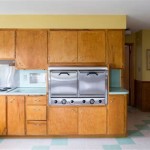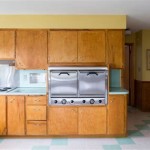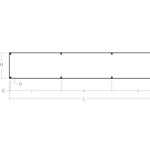How to Arrange Kitchen Cabinets: A Comprehensive Guide
Arranging kitchen cabinets is a crucial step in designing a functional and aesthetically pleasing kitchen. Whether you're embarking on a kitchen remodel or simply want to optimize your current space, thoughtful planning and careful execution are essential. Here's a comprehensive guide to help you arrange your kitchen cabinets like a pro:
1. Determine Your Storage Needs
Begin by assessing your storage requirements. Consider the types of items you need to store, their size, and how frequently you use them. This will help you determine the appropriate sizes and quantities of cabinets you'll need.
2. Establish a Kitchen Work Triangle
The kitchen work triangle is the imaginary path between the three main work areas in your kitchen: the refrigerator, sink, and range. Placing these appliances in a triangle optimizes workflow and minimizes unnecessary movement.
3. Plan for Base Cabinets
Base cabinets provide the foundation of your kitchen cabinetry. Consider a mix of drawer and door cabinets for optimal storage. Drawers offer convenient access to frequently used items, while doors provide concealed storage for bulkier items.
4. Design Upper Cabinets
Upper cabinets add vertical storage space to your kitchen. Plan their height and depth carefully, ensuring they don't obstruct your view or create a cluttered appearance. Glass-front cabinets can display your favorite dishes and provide an illusion of spaciousness.
5. Utilize Specialized Storage Solutions
In addition to standard cabinets, incorporate specialized solutions to maximize storage capacity. Corner cabinets with lazy Susans provide easy access to hard-to-reach areas. Pull-out shelves, spice racks, and hanging rods optimize storage for specific items.
6. Enhance Functionality with Lighting
Proper lighting is crucial for illuminating work areas and showcasing your cabinetry. Install under-cabinet lighting to provide task lighting, and consider ambient lighting from recessed fixtures or chandeliers for overall illumination.
7. Consider Style and Materials
In addition to functionality, your kitchen cabinets should complement your kitchen's design. Choose materials and finishes that match your desired style, whether it's traditional, contemporary, or somewhere in between. Solid wood, thermofoil, and laminate are popular cabinet options with varying durability and price points.
8. Install and Level Cabinets
Once you have your cabinets arranged, it's time for installation. Ensure cabinets are level and securely fastened to the wall or floor. Use shims and spacers as needed to adjust for uneven surfaces.
Conclusion
Arranging kitchen cabinets effectively requires careful planning and attention to detail. By following these steps, you can create a kitchen that is both functional and visually appealing. Remember, the key is to optimize storage space, establish a logical workflow, and enhance the overall aesthetics of your kitchen.

How To Organize Your Kitchen Cabinets Step By Project The Container

How To Organize Your Kitchen Cabinets In 3 Simple Steps Practical Perfection

How To Organize Kitchen Cabinets In 9 Simple Steps Trusted Since 1922

How To Organize Kitchen Cabinets Cabinet Organization Clean

25 Best Ideas For How To Organize Kitchen Cabinets
:max_bytes(150000):strip_icc()/crop-silvery-blue-cabinets-2000-70acba9f5faf464aa377714297d92570-a9692c7ba11e44ac86bc8f41c0a9fb42.jpg?strip=all)
How To Organize Your Kitchen Cabinets According Experts

How To Organize Kitchen Drawers And Cabinets Shannon Gold Design

Organizing Kitchen Cabinets In Five Easy Steps Town Country Living

How To Organize Kitchen Cabinets

21 Ways To Organize Kitchen Cabinets Declutter Cabinet Organization New
Related Posts








